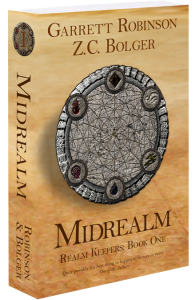Garrett Robinson's Blog, page 81
July 9, 2013
I’m Not Boycotting Ender’s Game
Let me tell you why I’m not going to boycott the upcoming film Ender’s Game, despite feeling the same way many people do about the policies of the author of the book the movie is based on: Orson Scott Card.
First, though, let’s lay out those policies for anyone who may be unaware of them.
Card has said such gems as:
“The goal is to discourage people from engaging in homosexual practices in the first place and, when they nevertheless proceed in their homosexual behavior, to encourage them to do so discreetly, so as not to shake the confidence of the community in the polity’s ability to provide rules for safe, stable, dependable marriage and family relationships.”
“When I read the statements of those who claim to be both LDS and homosexual, trying to persuade the former community to cease making their membership contingent upon abandoning the latter, I wonder if they realize that the price of such “tolerance” would be, in the long run, the destruction of the Church.”
“Laws against homosexual behavior should remain on the books, not to be indiscriminately enforced against anyone who happens to be caught violating them, but to be used when necessary to send a clear message that those who flagrantly violate society’s regulation of sexual behavior cannot be permitted to remain as acceptable, equal citizens within that society.” (I must state that this last, commonly interpreted to mean America should make homosexuality illegal, seemed rather to me to apply to the “laws” of the Church of the Latter Day Saints, of which Card is a member. Not that that improves our view of Card’s opinions whatsoever—but it does make him seem slightly less unhinged).
There are more. I won’t ruin your day with them. Suffice it to say, Card could be considered somewhat of a homophobe.
And yet.
Ender’s Game is a story about anti-judgement, anti-bigotry and anti-hatred. There’s no other way to look at it. TOTALLY MASSIVE SPOILER ALERT—SERIOUSLY, DON’T READ ON IF YOU HAVEN’T READ THE BOOK: Ender accidentally facilitates the destruction of an entire species, only realizing afterward what he’s done and feeling terrible for it. And in the further books, he spends the rest of his life trying to correct what he’s done.
IMHO, there’s no other way to interpret the book or the series. It’s a series about tolerance, understanding and respect of “the other,” even when you can’t understand it.
Don’t ask me how such a book and series spawned from the mind of such a man.
And in the end, the message of the film is more important than the message of its creator. It has broader reach and more appeal. More people hear about it, more people know it. If you took the number of people who have read Ender’s Game, and then find out how many of those people even KNOW about Card’s homophobic views, I’d bet you’d find out it’s an extremely small percentage. I didn’t even know about his views until two months ago when I expressed excitement to see the film.
The story’s message will live on long after Card and his ilk have perished from the Earth. Hell, Card (whose policies will probably be forgotten about one day) may be hailed in the future as a prophet of tolerance—creating an interesting reverse of the path of Ender’s life when he went from proclaimed savior to reviled villain of history.
I will give you an interesting parallel, prefaced with a request NOT to interpret this as a comparison between the two.
Let me stress that again—I am not saying these two are similar, on the same scale of morality, or in any other way comparable other than in the exact context of the analogy I am about to deliver:
Martin Luther King, Jr. was, if not homophobic, at least mildly censurous (just coined that shit) of it. In his only public exchange on the subject, he said it was a “problem” which could be “solved.” Maybe it’s me, but I can’t help but think of the Bachman’s gay reform camps.
And yet, is this what we take away from King’s life? Of course not. His greater, more important, and more known work by far is his work in african-american rights. That is all we SHOULD take away from his life, because that is the only subject upon which he was unquestionably qualified to be heard.
Similarly, the only thing I believe will ever be truly worth remembering about Card is his art and his writing—and in none of it have I ever seen an iota of intolerance. The only people in Ender’s Game who preach hate and intolerance are the bad guys, the bullies, who—again, spoiler alert—often end up dead.
If Card’s personal intolerance had a negative cultural impact that was in any way on the same scale as the positive cultural impact of his art, I might consider taking action. As it stands, the two aren’t remotely close.
Supporting the tolerant art while vilifying the intolerant artist is enough protest for me. And vilifying the tolerant art because of the intolerant artist is, by contrast, destructive of the message that we ourselves believe in.
This is the viewpoint I’ve formulated. I’m more than willing to hear counter-arguments. (Well-reasoned ones, of course; no flame wars). What do you think about this subject? Will you be boycotting the film?
July 7, 2013
What’s Wrong With Today’s Fantasy (According To A “Select Few”)
This article may end up going in my new Midrealm book (shameless plug HO!) as an author’s note, because it’s basically the reason I’m writing that book.
To me, and a select few of my friends (my readers, the people I’m writing the book for), it’s hard to find good fantasy these days. I have a very specific theory as to why that is.
A lot of fantasy these days is DEPRESSING.
I’m probably not the first to say this, but that’s what it boils down to for me. Game of Thrones was good because it was unique. It was dark, dark, dark, and it killed off its characters with wild (some would say over the top) abandon. I’d never seen anything like that before. I mean, Thorin and Boromir dying in The Hobbit and The Lord of the Rings was one thing. But killing off Ned Stark at the beginning of A Game of Thrones? Christ almighty! He was the main character!
(If you’re sitting there screaming “SPOILER ALERT” at your monitor right now, bite me. You don’t get spoiler alerts for books that are over ten years old or TV shows that are over a year old. If you’re screaming “SPOILER” alert for either of the Tolkien books, take it a step further and jump off a cliff. Into water, because I don’t endorse suicide.)
Well, GoT is still good, but it’s far from unique now. I feel like every fantasy book that’s recommended to me is just so goddamn dark and gritty that I feel like I need to take a shower afterward. Ever read the Malazan Book of the Fallen? Holy crap. Nothing good ever happens in that book. To anyone. It’s MORE depressing than Martin’s works.
Maybe it’s just me. Maybe I’m overly sensitive to this kind of thing. Hell, I saw World War Z at my wife’s request last night, and it ruined my evening. Not that it’s bad—it’s a fantastic movie. I’m just one of those weird people who don’t like to sit in a movie theater for two hours in utter, abject terror, wondering when the next terrifying thing is going to jump out at the camera.
Weird, huh?
Anyway, back to fantasy. Fantasy seems to have gotten into a trend of being dark, gritty, and ultimately depressing. I can’t remember the last time I read a feel-good fantasy book. At the very least, people don’t recommend them to me.
And so I decided to write one.
The book’s not all butterflies and rainbows. Things aren’t happy, otherwise there’d be no conflict. The bad guys are winning. And yes, people will die.
I won’t, however, kill off major characters the audience loves just because “I always like unexpected things.” It worked in GoT. The first time. The Red Wedding, by contrast, was an abysmal failure to me, because if Robb had a tenth of the brain cells he’d been displaying for the whole rest of the series, he never would have relied on some custom of “sharing food” to keep him and his army safe under the Freys’ roof.
And in the end, the reader will feel good. I’m not even saying the good guys will win, but there will be a victory. Barely. It will be costly. Midrealm will never be the same as it was.
But I’m not going to kill off everybody I’ve spent four or five (maybe six?) books making you love, either.
Maybe it’s just me who feels this way. Maybe I’m the only one who likes books that make me feel better about life, that make me hopeful and give me characters I can aspire toward. Maybe. But half a billion sold copies of Harry Potter indicate that I’m not, better than the fifteen million sold copies of Game of Thrones tell me I am.

If you agree, you can go pre-order a copy of the totally non-depressing book Midrealm and start reading a story that might actually make you smile. Click the pic.
July 3, 2013
Midrealm Is Available For Pre-Order
Hey guys,
If you’re not an avid listener of my podcast(s) then you may not have heard about Realm Keepers yet. It’s my new serialized fantasy series, co-penned with fellow indie author Z. C. Bolger.
It’s pretty fracking awesome.
Anyway, we’ve been talking it up on the show for what feels like forever. Last night, we finally opened up Midrealm for pre-orders.
If you already know me as an author, and you like my books, I can promise you: you’ll like this one. It’s pretty amazing. I’m super, super proud of it.
What you’re pre-ordering is the paperback. What you’re GETTING is the paperback, numbered and autographed by me and Z, plus the ebooks emailed to you (for free) a week at a time. It’s like watching a TV show, getting the episodes for free each week, and then getting a boxed set of the DVDs at the end.
Pre-order customers also get a special short story called Greystone, set in the world of Midrealm. This isn’t going for sale to anyone else. It’s only for those who pre-order.
And here’s another thing: we had a little bit of a snafu. When Z and I originally calculated the price, we thought we could sell the book for $14.99. And we promoted that on the podcast. Then, as writing continued and we got more exact proofs, we realized that we had to sell it for $17.99 or it just wouldn’t be worth it.
But, because we promised our podcast listeners already, we agreed to keep it at $14.99 for the first three days.
That means that UNTIL FRIDAY, you can get it for $14.99 (plus shipping—duh).
If you’re a Rebel already, you got Episode One and Greystone for free. If you’re not—why not? Don’t you want cool stuff? You should totally go sign up at this link.
But if you’re not, you can get them RIGHT NOW. You’ve just got to go pop over to therealmkeepers.com and pre-order it now. You totally should. Because you’re probably going to want to buy the book later when I’m big and famous. And then it’s going to cost more money. AND it won’t be autographed and numbered. And you’ll never read Greystone.
It’s not like you’ve got forever. So what the hell? Head over and pick up a copy.
June 24, 2013
STP 017—Writing Science Fiction
So, you wanna talk about off-topic? This episode is ostensibly about writing science fiction. Actually, it devolved into a discussion about our favorite science fiction books and films—during which time we completely neglected to talk about The Matrix. Ah well. It’s still got entertainment value. Give it a listen, won’t you? Or watch the YouTube video here:
June 21, 2013
BOOK REVIEW: The Beam, Episode 1
Well, Amazon hasn’t been letting my reviews through in a while, so I’m forced to post here.
DISCLOSURE: I received a free copy of this book in exchange for an honest review.
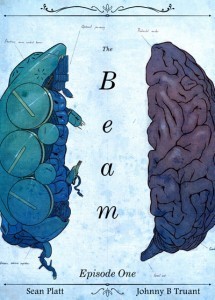
Click to buy via my affiliate link
What is Sci-Fi?
Sci-Fi usually projects a future that humanity will find itself within, where the rules have changed and the ethics and morality of the past — i.e. TODAY — are put to the question.
Ender’s Game dealt with the moral question, not yet posed by reality, of “What should humanity do when we encounter an alien race that seems hostile?” Further books in the series broadened this to, “What about if we meet a new, benign race of primitive technology?” and “What are humanity and sentience?”
Asimov’s I, Robot dealt with the future of robotics that he saw swiftly approaching and how humanity would have to deal with it. Among the questions he posed are, “Does artificial life deserve the rights of all life?” and “Do we have the right to remove from our creations the same free will that God has given to us, his own creations?”
And so we come to the Beam.
SLIGHT SPOILERS:
The Beam deals with a futuristic America in which our two current political parties are extrapolated to their extremes. There are only the two parties: Enterprise and Directorate.
Members of Enterprise enjoy the ultimate in free-market capitalism, free from regulation or restraint, but have no safety net. If they fail, they starve. If they succeed, they become the richest people on the planet.
Members of Directorate have their every basic need tended to by the government. They will never starve, never die of illness, and only have to work if they want to (as most menial tasks are automated in this future world of the late twenty-first century). Their trade off comes from the fact that they cannot rise above their position: they receive their dole and must accept it, because they may receive no other income directly. All in Directorate are equal.
In Enterprise, the rich get richer and the poor get poorer. In Directorate, all are equal in their mediocrity.
Political affiliation is a choice, and binds one to the party he or she has chosen. But every six years comes Shift, where a member of society may (if they wish) change from one party to the other.
The balance of the parties’ power can change dramatically during Shift. Senate seats are determined by how many citizens belong to each party. Hence, both parties work hard to ensure as many people choose to join or remain with their party as possible.
In the midst of this — only hinted at in this, the first episode — a new technology is emerging that could change the balance of power, and perhaps the very bedrock of society, forever. Its source is uncertain, and only one of The Beam’s main characters knows about it: Doc, a grey-market nano enhancement vendor who caters to clients with a flair for the unusual in their bionic enhancements.
Aside from Doc, an impressive cast of characters populates this book, ranging across the entire spectrum of society, from ultra-rich Enterprise agents, party-ruling Directorate members, vapid artists, high-class escorts and members of the mysterious, only-hinted-at Organa (who I suspect will have a LARGE role to play as the series unfolds).
The question posed by The Beam is: Who would you be? What would you choose? Would you rather be cared for by a government, entrusting them with all responsibility for your life, and thereby ensuring safety for yourself and those dearest to you, your family and friends? Or are you a risk-taker? Would you rather cast yourself recklessly into the jaws of society and battle your way to the top in a winner-takes-all gamble?
I know my choice. Do you?
I will be reading every installment of this series the moment it comes out. I have already highly recommended it to others. I will continue to do so.
It is the best science fiction I have read in a long, long time. Not since I was a teenager reading Ender’s Game have I felt this involved in a series.
5 Stars.
June 19, 2013
You’re Not Special
Here’s why Man of Steel didn’t work – hell, why Superman has NEVER worked, at least for me.
Don’t get me wrong, I was entertained. The action was good, and – surprisingly for a comic book movie – I found myself noticing how much I liked the cinematography. The effects were nice and seamless. Acting was nice, and I didn’t find myself bothered by the much-discussed plot holes (which were there, but not in a tremendously greater degree than they are in EVERY SINGLE SUPERHERO MOVIE EVER).
But it didn’t work. It didn’t get me, never had that “whoah” moment. I walked out of the theater saying not, “that was AWESOME,” but instead, “no, I actually liked it.”
Truth be told, I’ve never had a Superman movie or comic book do that to me, other than maybe the Doomsday saga. (Spoiler alert: Doomsday kills Superman).
And there’s a very simple reason Superman just doesn’t hit me where it counts.
No one ever tells him “You’re not special. You’re just another person out there. You aren’t any better than anyone else, and you’ll never amount to anything unless it’s out of sheer dumb luck.”
How COULD you say that to Superman? He’s FUCKING SUPERMAN. And the whole goddamn movie, everyone from his Gladiator dad to his Dances With Wolves dad to both his moms (seriously, this guy has more confusing parentage than everyone in Game of Thrones combined) to Lois Lane spends BASICALLY ALL OF THEIR SCREEN TIME with Supes telling him how amazing, special and world-changing he is.
Everyone has always told Superman how special he is.
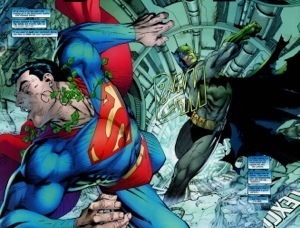
Except Batman. Batman doesn’t give a fuck.
Why does this have a problem resonating with us?
Because that’s not what any of us have gone through.
Society in general and people in particular love to tell you you’re not special. You probably grew up with the idea that you’re just another cog in the machine – that a good job and a white-picket-fence house is the best thing you can aspire to in this life.
Oh sure, I’ll bet you had one or two people, probably your parents, maybe your spouse when you got older, tell you that you were special. I hope you did. Some people don’t even get that.
But you went to a school where no one thought you were the best person there. Your teachers treated you just like everyone else in the class. And then after you graduated college or high school, you went out into a wide world that didn’t give a flying fuck about you.
“You’re not special.”
Maybe you’re not special. If not, it’s only because you don’t want to be. And that’s fine. Plenty of people don’t want to be special, or at least they don’t want that recognition. They just want to have a steady job, a good family and a fun life — of course, few of them realize how special that is in and of itself.
But if you want to be special, man, there’s never been anything easier.
No one else in the world looks exactly like you. If they do, you can cut your hair. Or shave your head. Or pierce something (not recommended, but it’s up to you).
Do you realize how incredibly hard it is to duplicate an exact human’s voice? The timbre of each person’s mouth noises are so complex, it’s taken technology years to develop a software that can even understand it. Of course, now there’s voice recognition software that can recognize WHO is speaking to it. And why? Because each person’s voice is unique.
If you were to take this article, the message of it, and re-write it yourself, you wouldn’t use the same words. You’d use different ones — maybe better ones.
YOU ARE UNIQUE.
Yes, as the old joke goes, you’re unique just like everybody else. But you can use that uniqueness, because nobody else has your life. Nobody else has your experiences. And experiences are how we judge things. Experiences are how we evaluate the parts of life and society. And so no one else makes the same judgements and evaluations as you do.
Guess what? You’re fucking special.
And society’s been telling you different your whole life.
Fucking society.
So if you WANT to be special, if you WANT to stand out from the crowd, realize that’s the easiest thing in the world. Just start talking about what you want to talk about or what you do. It isn’t the same as what anyone else is doing or has done in the history of anything ever. It couldn’t be. You’re not them.
That’s why it can be a mistake to imitate someone else’s style in the arts. Sure, learn from them technically. See what works for you. Take what you can from what others have done before you.
But put your own spin on it.
Because you’re fucking special.
June 17, 2013
STP 016—Writing Fantasy
Continuing our “genre-a-week” series, this week we discussed Fantasy: what it is, how to write it, and all the different forms it takes.
FANTASTIC
We came to a general consensus that fantasy primarily has to explain things that can’t be explained by physical laws; in other words, things that are supernatural or magical.
TIMELINE
Thing with fantasy is it can take place anywhere and in any time. There’s historical fantasy, epic fantasy, contemporary fantasy, futuristic fantasy (Star Wars, anyone?).
THE FANS
The live audience interaction on this show was off the charts, and while it did somewhat distract us during the actual broadcast, it was well worth it for the Twitter shitstorm that followed, and I’m extremely proud to endorse a little podcast that should be starting next week, hosted by Carl Sinclair, where they will do a follow-up podcast…ABOUT this podcast. Sound dumb? We all agreed, Carl included—BUT IT ALSO SOUNDS TOTALLY FUCKING AWESOME.
Give it a listen, won’t you? Or watch the video here:
June 16, 2013
All Podcasts, Most Of The Time
So, you may be aware that I have three podcasts:
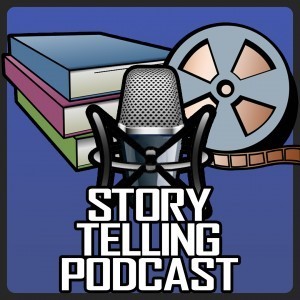 THE STORY TELLING PODCAST
THE STORY TELLING PODCASTThis is my main podcast. I hook up with independent authors Z.C. Bolger and VC Coll, and we talk about story telling. They’re obviously speaking mostly from a novelist’s perspective, whereas I try to bring a little bit of film knowledge into it. It’s by far our most popular podcast, sponsored by the Author Marketing Club and with a rabid fan base (sometimes a little over-rabid—more on that in another post).
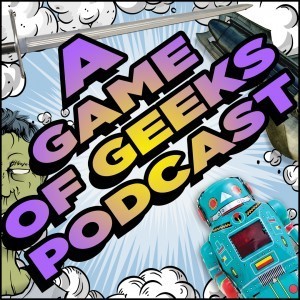 A GAME OF GEEKS PODCAST
A GAME OF GEEKS PODCASTThis is my geek podcast, where I talk about all the shit I don’t normally get to vent on with my “normal” friends. Indie author David Wright co-hosts, and we cover geek-centric TV shows. We just wrapped up talking about Game of Thrones, and now that Season Three is over, we’re moving on to Falling Skies.
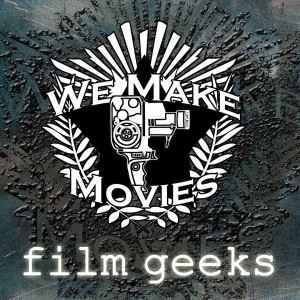 THE WE MAKE MOVIES FILM GEEKS PODCAST
THE WE MAKE MOVIES FILM GEEKS PODCASTI’m part of a filmmaking collective in Los Angeles called We Make Movies. It’s a really great group of people who get together and help each other make independent film. I’ve done more work with these people than all my other film work combined, and we have a lot of fun whenever we work together. One of the senior members, Chad Kukahiko, joins me for this podcast where we talk about film news, film process, and generally how an independent filmmaker can try and actually make it in this crazy world.
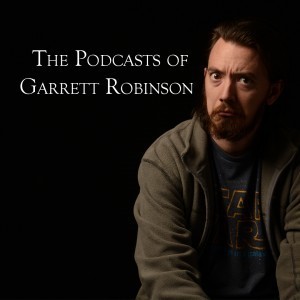 CONSOLIDATION
CONSOLIDATIONRecently I had the bright idea to consolidate all three of my podcasts into one, so that someone who just likes ME can listen to all three of them without having to subscribe to three different podcasts in iTunes (or Stitcher or whatever).
THE INDIVIDUAL PODCASTS WILL ALWAYS BE AVAILABLE.
I know some of my listeners are book-only people, or writers with no interest in film, so I wouldn’t subject you to the Film Geeks podcast. And similarly, we’ve got a ton of nerd listeners to Game of Geeks who don’t care about writing OR film, so I won’t make them listen to those, either.
But there is a pretty significant overlap in fans between the three shows, and I wanted to give them another option.
So now it’s done! I’m still loading in back episodes, but if you want to subscribe and hear all the new ones, you can click on this button:
This is going to be my most consistent source of updates on this blog. I’ll still try to put out articles and updates via text for you old-school types (wink) but the three podcasts are the only thing that I absolutely never fail to do, every time.
Enjoy! I hope to be in your earholes soon.
June 15, 2013
Overnight—Short Film Premiere
Howdy y’all.
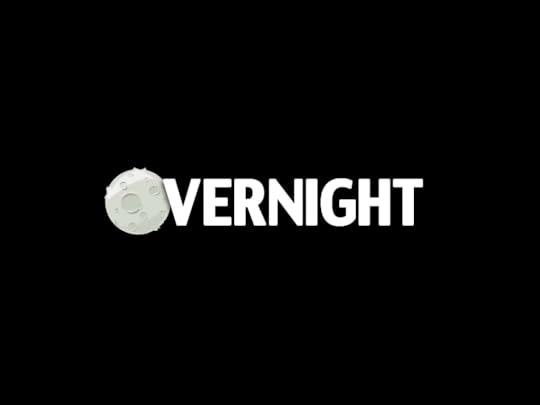
Boom, bitches
So, I’ve got a little short film called Overnight. Not that little, actually—a good 23 minutes long.
It’s pretty awesome.
I’ve been working on this film for months, and it’s finally premiering next Sunday night at 8:00pm, at a little club in Hollywood called The Three Clubs. This is a very cool club, great people, good staff, and they’ve been honorary members of We Make Movies for quite some time now.
Anyway, this is my first big film premiere. If you know me, and if you’re in L.A., it would just tickle me pink if you’d come. I’m not making any money off the film. I just want to share it with you, and make you laugh.
Hope to see you there. I’ll be showing up at around 7:00pm to start getting drunk (I’m shitting a brick with nervousness right now, so I’ll want to loosen up before the actual film shows).
Cheers!
June 13, 2013
AGoG 010—Game of Thrones Season 3 Finale
Well, this week we grudgingly covered the Game of Thrones Season 3 Finale. I say “grudgingly” because it was kind of underwhelming. At least when compared to last week’s Red Wedding shitstorm. But we did our best, faithful listeners.
Give it a listen, won’t you? Or watch the video here:

